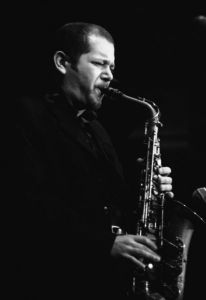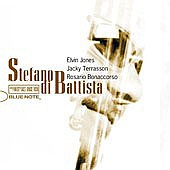
Photo by Dimitri
Ianni

Blue Note

A FIRESIDE CHAT WITH STEFANO DI BATTISTA
I don't speak Italian well. Outside of "stugots" and other words that have become part of my vocabulary because of my ever increasingly devotion to The Sopranos, my Italian is less than zero. Thankfully, Stefano di Battista speaks English or I would have been assed out. I have been following Battista since his Blue Note debut, A Prima Vista. Battista gets a sound on the alto that is something to behold. It is fierce. No wonder Wynton thinks of him so highly. I present to you Stefano di Battista, unedited and in his own words.
FRED JUNG: Let's start from the beginning.
STEFANO DI BATTISTA: I was starting with a little folk band near my country and I went to the school because my father, he told me, "Stefano, you know there is a school. Why you don't go?" I say, "OK, I will go." The professor gave to me a sax alto, but it is not me that decides to play this instrument. It was just occasionally. I like the alto. I start to like this and the professor says to me, "You have to play alto." And I say to him, "No, I would like to play clarinet." He said, "No, you have to play alto." "OK, I play alto." And I started to like this and I love alto now.
FJ: Did you spend much time practicing?
STEFANO DI BATTISTA: Not too much. Not too much. I was playing because sometimes I was in my home with my mother and father and sometimes I was playing everyday and sometimes I never played. Sometimes, yes, everyday and sometimes, nothing. And I remember my mother told me, "Stefano, stop please and go a little with your friends." Now, I practice more regularly. I practice everyday and maybe one hours, two hours. It depends from my work also and when I need to tour, I practice also before the concert, half and hour, one hour, but everyday.
FJ: Whom did you listen to?
STEFANO DI BATTISTA: I was start with Art Pepper because I was sixteen when I discovered jazz. So I discovered jazz in a newspaper because I find a jazz magazine with a vinyl inside and so I was really curious to hear this music. Three years after, I started to play saxophone. I saw a photo of an alto saxophone. It was a compilation with Cannonball Adderley, Art Pepper, Johnny Hodges, and so I was curious and I buy this newspaper and when I was in my home, I just put on and I say, "Wow, I would like to play like Art Pepper." It was really, really good discover.
FJ: What was it about Pepper's playing?
STEFANO DI BATTISTA: To me, it was the first time I listened to saxophone jazz. So I was attracted by Cannonball Adderley, Art Pepper, and everybody. The thing that I loved about Art Pepper was his sensitivity and his fluidity. It was so, so sweet when he was playing the saxophone and maybe it was this way that I loved him quickly.
FJ: Both Pepper and Cannonball had breathtaking melodic sensibilities.
STEFANO DI BATTISTA: Yeah, yeah, I love melodic players. I start to love a musician like Wynton Marsalis and I finish to Keith Jarrett, so inside we have a lot of kinds of musicians. I like a lot of musicians, even different musicians. Now, at this moment, I love a guy. I don't know if he is famous in America or not, but I like very much him, Rick Margitza. He is a friend of mine and he was playing with Miles and I love his playing. I love also, very much, Joe Lovano.
FJ: You spent some time playing with the late Michel Petrucciani.
STEFANO DI BATTISTA: Yeah, I love him. I was playing with Michel Petrucciani for two years. So, yeah, that's the point. Michel Petrucciani was somebody that was playing always with a lot of melody in his play and so you're right, Michel Petrucciani, I think, was one of the best for me and I liked really very much his playing. He was so melodic. Michel, he was so, so open. He let me have space in the concerts and so, for me, it was easy to make a solo because it was open. When we was playing, every time, I was relaxing to play with him and we make a little duo and trio and it was kind of a very good job for me. It was so, so beautiful.
FJ: You continue that openness now with a pianist you have had a close
association with, Jacky Terrasson.
STEFANO DI BATTISTA: Yeah, yeah, right, I love Jacky Terrasson because he is so, I mean, he is able to do a solo, but also to be behind a soloist. So if I play a solo, I love when he is behind me and plays the chords with all of the discretion. My impression is that he plays an arrangement in real time when he's behind me and so I love that way.
FJ: You appear on his latest Blue Note album, Paris… and he is featured
on your soon to be released self-titled endeavor for Blue Note.
STEFANO DI BATTISTA: Yeah, but with Jacky, we start now to make a lot of stuff. We're supposed to do something for the future also. I hope it will be possible to do other stuff because it is easy to work with him.
FJ: Your new release has a different lineup from your Blue Note debut,
A Prima Vista.
STEFANO DI BATTISTA: Yeah, this is the second album. The first was with my old quintet with Flavio Boltro and Rosario Bonaccorso.
FJ: In your own observation, how is your latest self-titled Blue Note
recording different from A Prima Vista?
STEFANO DI BATTISTA: I don't know because A Prima Vista was, I called it A Prima Vista because we was at the studio and I write a tune, every tune, four or five days before. So for that reason, we called this album A Prima Vista because everybody, it was the first time they were reading my music. It was cool because when we make one take is always better than the third and fourth take.
FJ: Your old partner in crime, trumpeter Flavio Boltro guests on the new
record.
STEFANO DI BATTISTA: Yeah, for two tunes. We was playing for maybe ten years. Flavio was every time with me and I was attracted to his way of making fusion of my sound and his sound. So when we was to make a melody together, even when it was in unison, it was really lovely because sometimes when we make unison with some musician, we have a different sound and we have a different result at the end of the playing and with Flavio, my impression was that it was one sound for both instruments. So I like that. I love Flavio and I would like to still play with him for sure. I just now had a really great experience with Wynton Marsalis two weeks ago. He was playing with my quartet for three hours in a jazz club. It was so, so beautiful and I think maybe we can do something. Wynton played with my band for three hours and he asked me to do something with him, so it was really, really nice. I like Wynton like Flavio and they are friends, so maybe we can do something with a little band with two trumpets and two saxophones. That would be great.
FJ: You should make your way across the Atlantic more often.
STEFANO DI BATTISTA: The last time was with Elvin Jones in the Blue Note for one week and we were in Philadelphia also. Sometimes, but you know I have a lot of work to do in Europe now, but I would like to come back to New York as soon as possible, maybe to make the presentation of this album. We have something like one hundred concerts, so we have a lot of concerts to do. In America, it is difficult for us, for me because I am European. It is not easy to come to America, but we will try to do because it is expensive for everybody to come. It is a little bit more complicated. Thank you so much and it would be great if I do come, maybe I can meet you and maybe just drink a little coffee and maybe we learn a little English better than now.
Fred Jung is the Editor-In-Chief and undercover operative in the Columbian Drug Cartel. Email Him.